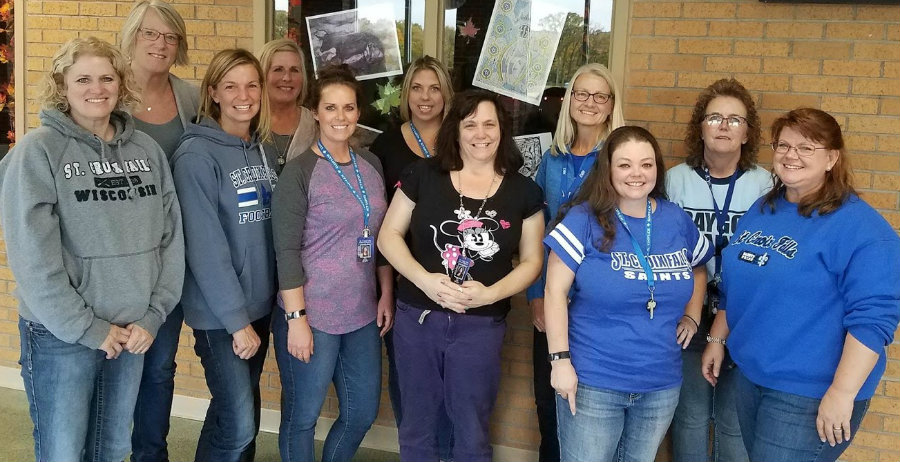One of Our Greatest Gifts – The Power of the Para
A MiddleWeb Blog

The child was choking on a cinnamon disk. (Those candies are lethal. Remind me to tell you about the time my daughter almost choked to death on one during a harrowing airplane ride…)
The para was working with a small group when she noticed a kiddo who had her hands crossed holding her neck, making the universal “I’m choking” sign. The para asked, “Can you talk? Can you breath?” The child shook her head no. The para didn’t waste a second before using the Heimlich maneuver, dislodging the cinnamon disk.
The best para team in the word (life-saver Mrs. Stauner at far right; grateful principal, me, in center.) Click photo to enlarge.
In honor of this experience, I want to share tips for working with paraeducators. They are often the lifeblood of the schools they serve. They are a gift to us, and developing good collaborative relationships with the paras at your school can mean the difference between a good school and a great school.
Tip 1: Recognize How Important Paras Are
Even if the paras in your building haven’t saved a life, they have made countless lives better. Below is an excerpt of the letter I wrote to my wonderful para team at the start of the year. I wanted these hardworking educators to know right off how important I think they are.
“Welcome to the new year! I am so grateful to have each of you on our team. I truly think that paras are the backbone of a school. You can see things that teachers can’t. You know the kiddos in a different way. You have tight relationships with the kids who need us most. There is no way to over-value the contribution you make. In many ways paras are the heart of the school. In my perfect world, you would earn three times what you currently get each paycheck. That is beyond my control (except as an advocate, and believe me, I will advocate at the local, regional, and national levels). In the meantime, please let me know how I can be helpful to you. I truly want to support you as a person and an educator.”
Take a minute to reflect on the work of paras in your building. As I always remind, paras often do the hardest jobs with the toughest students, and they do it for the least amount of money.
Tip 2: Trust Paras as Professionals
Conundrum here. I truly dislike the terms “paraeducator” and “paraprofessional.” Although the prefix para comes from the Greek and means beside, to me it connotes a meaning closer to extra or other. And paras are by no means extra or other-ish. They are an essential part of almost any school. They are professionals. We should trust them as such.
In my perfect world, schools would minimize hierarchies altogether and the folks who serve in them would all be called educators. They would, of course, have different functions and pay, but to the children, they would just be educators.
Teachers, we have to be careful to not let our egos get in the way of recognizing that paras often know certain students and their needs better than we do. Similarly they often know, more deeply, the communities the school serves. That knowledge is invaluable. Paras have information, ideas, and strategies to share, and we’d do well to listen to them.
Trusting paras as professionals also means helping the students treat them as such. In my school, I often remind students, “We hire the best adults possible to help you learn. Every single adult here will be accorded respect and care.” A student would no sooner backtalk a para than she would a teacher. There is no distinction.
Tip 3: Communicate, Communicate, and then, Communicate More

I have often seen strained relationships between teachers and paras that stem from continuing misunderstandings. Above, I noted that teachers should listen to paras. The flip side of that is we should be very clear in terms of communicating their roles in the school.
Below are the expectations I shared with paras in a welcome letter. Of course, it is from the principal’s perspective rather than that of the teacher. But I think it can serve as an example for teachers too.
1. Learning comes first. If you are working with a student and don’t know how to support her/his learning and/or IEP goals, ask for support. ALL students can learn and benefit from a rigorous curriculum at their level. Let’s work together to keep ALL moving forward with their skills.
2. Work with your teacher(s) to develop a schedule. If a teacher is not giving you direction, please let me know.
3. When there is extra time, teachers have a folder marked “TO DO” with simple tasks that need to be accomplished; please check the folders as often as you can.
4. Limit cell phone use to break time. Please do not use Facebook or other sites during contact time with students. If you need to check something, do it out of sight of students and parents.
5. Support the playground and lunchroom rules we worked together to establish. Please know you are on the “front lines” for helping kids learn character. C.A.R.E.S. (cooperation, assertion, responsibility, empathy, and self-control) are traits we can all agree our kiddos need.
6. Be a team for each other, stay kind, confront with care. If you have a problem with someone, tell them about it in a kind way. We have to have each others’ backs.
7. Please do not communicate with students’ families directly about academic, behavioral, or social issues. Confidentiality laws (especially with students who have IEPs) are important. Last year we had several families who received mixed messages, and it led to some unfortunate outcomes. Please let the classroom or special ed teacher communicate with families unless you have specifically been asked to do so by a supervisor.
In addition to big-picture communication like this, making the time to chat with paras about student needs is important. If you can’t get that done face to face, establish an email pattern or a shared document to use as a tool to share insights.
Perhaps most importantly, be honest. Too many times I have seen relationships between educators crumble because one doesn’t like something the other does but never is assertive enough to bring it up to her/him. The kind thing to do is to be honest and open. It is far better to “confront with care” than to let irritations fester until relationships are shattered. Check out my post on rejecting rudeness and keeping school climate positive by confronting with care here.
Tip 4: Offer Professional Development for Paras
This tip really winds its way in and out of all of the others. Paras, like all educators, need and generally want professional development. Whenever possible, offer them training on the programs and procedures at your school. If teachers are learning about the school’s crisis plan or the new reading curriculum, so should paras. The problem, of course, is how to make that happen. I have used the following solutions.
1. Find funding to pay for paras to attend staff development. Thankfully, my superintendent and school board are amazingly supportive. If your school has National Education Association members, there is a Learning and Leadership Grant that provides money for para professional development.
2. Steal an hour from the day. Work with other teachers to find a way to cover classes so that paras can learn together during the school day. It can be a juggling act to be sure! At my school we try to “steal” an hour a quarter for this purpose. It gives paras time to bond as a team, to learn about school initiatives, and to share ideas and suggestions with me.
3. Spring for a working lunch. If you’re a teacher, take the para you work with out for lunch or stay at school and eat pizza together. Use the time to collaborate or to simply provide training.
4. Share articles and videos. The vast majority of paras I have worked with truly want to do what is best for the school. If you offer them intermittent, meaningful links to helpful videos and articles, you might be surprised at the difference it can make.
The Heart of the School
Never forget your paras are right at the heart of the school. Keep them close to your heart and on your mind. They deserve it.




































Thank you for this clear and precise definition of the role and responsibility of Para’s in an educational setting. Also, I appreciate the fact that Para’s should be at the center as opposed to being only an observer on the outskirts of the learning institution.
You are so welcome! Thanks for the comment!